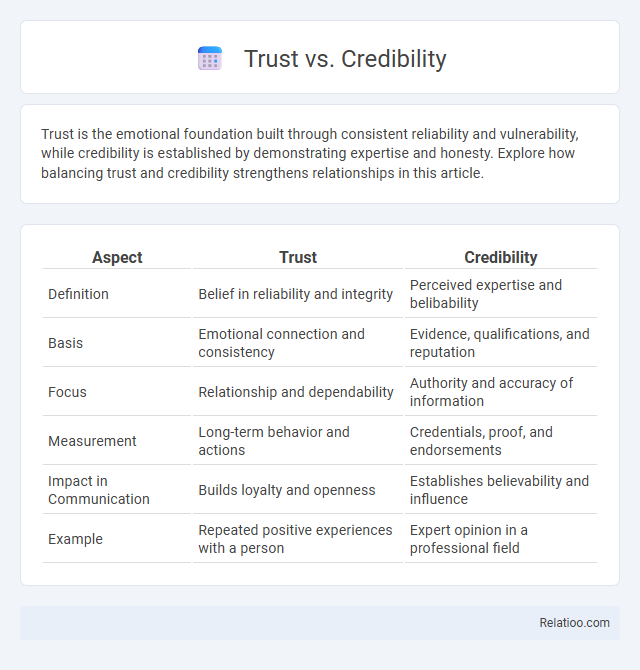Trust is the emotional foundation built through consistent reliability and vulnerability, while credibility is established by demonstrating expertise and honesty. Explore how balancing trust and credibility strengthens relationships in this article.
Table of Comparison
| Aspect | Trust | Credibility |
|---|---|---|
| Definition | Belief in reliability and integrity | Perceived expertise and belibability |
| Basis | Emotional connection and consistency | Evidence, qualifications, and reputation |
| Focus | Relationship and dependability | Authority and accuracy of information |
| Measurement | Long-term behavior and actions | Credentials, proof, and endorsements |
| Impact in Communication | Builds loyalty and openness | Establishes believability and influence |
| Example | Repeated positive experiences with a person | Expert opinion in a professional field |
Understanding Trust and Credibility
Trust is the confidence you place in someone's reliability and integrity, while credibility refers to the qualities that make a source believable and authoritative. Understanding trust involves recognizing consistent behavior and honest communication that build a strong foundation over time. Credibility enhances trust by providing evidence, expertise, and transparency that reassure Your decisions and relationships.
Defining Key Differences
Trust is the belief in the reliability and integrity of a person or system, while credibility refers to the perceived expertise and believability based on evidence or reputation. Your ability to establish trust hinges on consistently demonstrating credibility through transparent actions and truthful communication. Effective differentiation between these concepts helps build stronger relationships and reinforces confidence in your brand or message.
Why Trust Matters
Trust matters because it underpins effective relationships by fostering confidence in reliability and integrity, which drives cooperation and loyalty. Credibility serves as the foundation of trust, built through consistent honesty, expertise, and transparency that validate an entity's claims and promises. Without trust, interactions suffer from skepticism and risk aversion, hindering collaboration and long-term success in personal and professional contexts.
The Role of Credibility
Credibility plays a crucial role in establishing trust, as it represents the perceived expertise, reliability, and honesty of an individual or entity. Your ability to consistently provide accurate information and demonstrate competence directly influences how others trust you. Without credibility, trust cannot be sustained, even if initial confidence is present.
Building Trust: Essential Strategies
Building trust involves consistent actions that demonstrate reliability, honesty, and transparency, which are crucial for establishing credibility with Your audience. Credibility stems from proven expertise, authentic communication, and ethical behavior that reinforce trustworthiness over time. Prioritizing relationship-building through accountability and genuine engagement enhances trust, leading to stronger, lasting connections.
Establishing Credibility: Best Practices
Establishing credibility requires consistent transparency, accurate information, and demonstrated expertise in your field. You build trust by delivering on promises and maintaining open communication to reinforce reliability over time. Prioritize showcasing verified credentials and customer testimonials to strengthen your authoritative position effectively.
Trust vs Credibility in Digital Media
Trust in digital media refers to the confidence users have in the reliability and integrity of information, while credibility specifically measures the perceived expertise and trustworthiness of the source. Digital platforms must optimize content accuracy, transparency, and user engagement to enhance both trust and credibility, as users increasingly rely on these factors to evaluate online information. Establishing strong credibility through verified credentials and consistent authoritative content directly boosts overall trust among digital audiences.
Impact of Trust and Credibility on Decisions
Trust influences your willingness to rely on others by establishing a foundation of confidence, while credibility strengthens that trust through demonstrated expertise and reliability. Decisions are heavily impacted when both trust and credibility are present, leading to greater acceptance and commitment to choices. Lack of either trust or credibility can result in skepticism, hesitation, and reduced decision-making effectiveness.
Challenges in Maintaining Both
Maintaining trust and credibility simultaneously challenges Your ability to consistently deliver truthful, transparent communication while meeting expectations. Misalignment between claimed expertise and actual performance can erode credibility, making it difficult to sustain long-term trust. Balancing honesty with positive messaging requires strategic attention to authenticity and accountability in all interactions.
Strengthening Trust and Credibility Together
Strengthening trust and credibility together requires consistent transparency, reliability, and authentic communication. Building trust hinges on delivering on promises and demonstrating competence, while credibility is reinforced by verified expertise and ethical behavior. Combining these elements creates a solid foundation for lasting relationships and enhanced reputation.

Infographic: Trust vs Credibility
 relatioo.com
relatioo.com